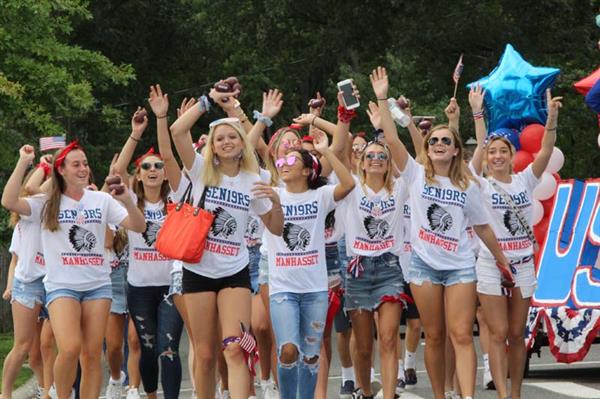For years, sports teams from Manhasset Secondary School and the rest of the district have been represented by the Indian mascot. Now, alumni and students are waging a campaign to change the mascot to avoid offending Native Americans, with a petition for the cause gaining over 1,700 signatures.
Efforts have grown in recent days as the Washington Redskins football team announced Monday that it would retire its name, which Native American groups have called a racial slur, and logo.
Jo Trigg, who graduated from Manhasset in 2004, created the petition on Change.org.
“Even as a young child in the early 1990s attending Munsey Park Elementary school, I knew that the Manhasset High School mascot, the Indians, was immoral,” Trigg wrote in a letter that accompanies the petition. “I graduated from Manhasset High School in 2004, and thought that as some time passed, the mascot would change. It never happened. Therefore, we all need to take initiative to ensure it is changed, once and for all.”
Citing an American Psychological Association resolution that recommends the retiring of mascots depicting Native Americans, Trigg goes on to say that there is “no way to justify the mascot as it is.”
“It is especially offensive given that the school has little contact with indigenous populations, and a community of predominately and historically white people have appropriated the mascot,” Trigg wrote.
She further writes that the new mascot should be decided by a vote of the Manhasset community.
Students and young alumni are also getting involved in the campaign, with the Manhasset Justice Initiative (MJI) including alumni from 1992 and rising sophomores alike.
Mia Krishnamurthy of Plandome Heights graduated from Manhasset Secondary in 2019, and says that she and several other MJI members met with district Superintendent Vincent Butera to discuss the mascot last week, which she says has “been in the minds” of alumni “beyond high school.”
“We talked about ways in which we could go about changing it, and following in the examples of other schools,” Krishnamurthy said. “He seemed to be very receptive and open to the idea. However, he’s definitely been emphasizing the need to have a community-based dialogue around this area before any administrative decision is made. We don’t know when that will be happening, but we hope it’s soon.”
Krishnamurthy added that the Native American community is “the voice we should be listening to” in the matter, and that the mascot’s existence normalizes students using redface, feather headdresses and other stereotypes as a costume.
“It’s not really a debate about whether or not it’s harmful or offensive,” Krishnamurthy said. “The Native American community has said for years that these are offensive, that we don’t want to be depicted in this way, that we want this to be changed. We just saw an NFL team change their name. If they can do it, why can’t we?”
Fellow MJI member Madelyn Sayed, who graduated from Manhasset in 2012, said that there is pushback to the idea of a change.
“From speaking at Board of Trustees meetings, it does seem that there is a group of people who don’t understand that it is offensive,” Sayed said.
Sayed said that part of the issue lies in a lack of education on the past of the Manhasset area.
“Something that I’ve been trying to emphasize is to educate people and connect the Manhasset community with local native populations, because there are native populations in New York state, on Long Island, and we really have this disconnect from the true history of the land,” Sayed said. “As far as I remember, there aren’t any events or dialogues to teach about native culture or history, none of that is in the curriculum. We’re disconnected from these roots, we don’t have text or events or leaders that talk about this connection, of what Manhasset was before it was a suburb.”
According to the Manhasset Bay Protection Committee, the Matinecock tribe of the Algonquin peoples resided on Manhasset Bay, with a fishing village located on what is known today as the “Miracle Mile,” until the Dutch came and settled the bay in the early 1600s. The name Manhasset is also said to have come from a native word meaning “island neighborhood.”
Sayed added that a dialogue about the mascot would be a way to teach about the past, and that the MJI is reaching out to tribal elders and representatives from other schools who have changed their mascots.
“This isn’t something that should be done only because there’s 2,000 signatures on a petition,” Sayed said. “There should be a real genuine understanding, a sense of humanity that natives are people, not mascots.”
Petition organizer Trigg ended her letter by stating what she imagined some reaction would be from residents.
“I am sure that this petition will be met with ‘…but it’s tradition,'” Trigg writes. “Lots of things used to be considered moral, lawful, and legal in the United States, including lobotomy, segregation, texting and driving, smoking anywhere you pleased, the list goes on. However, as you can see from this list, societal norms shift and change. What was once acceptable, no longer is. The Indian mascot is no longer justifiable in 2020.”
“We’re not erasing any of Manhasset’s history,” Krishnamurthy said. “We’re still Manhasset. We’re still orange and blue. But this is still an important decision to be made.”
Efforts to reach the district for comment were unavailing.



